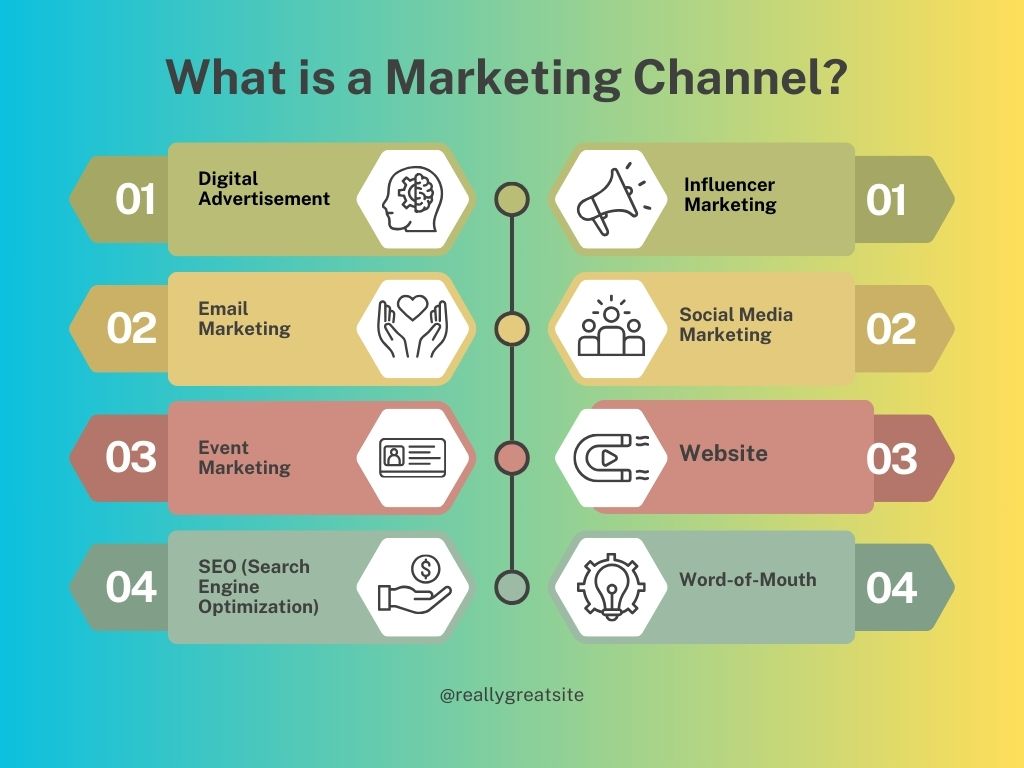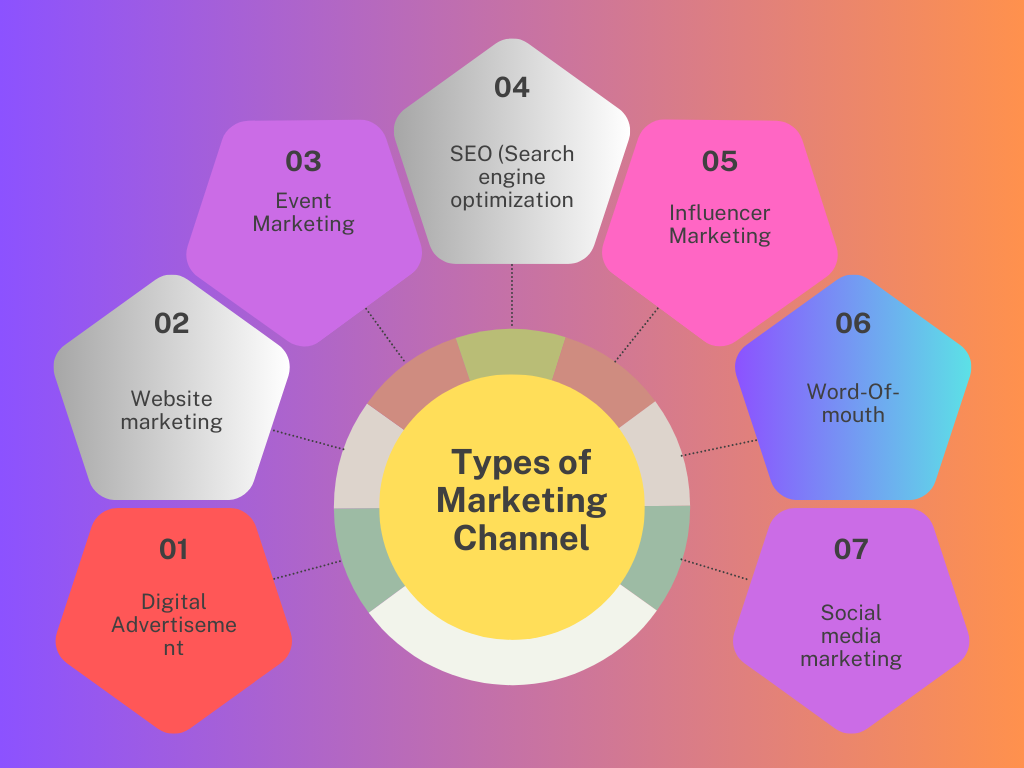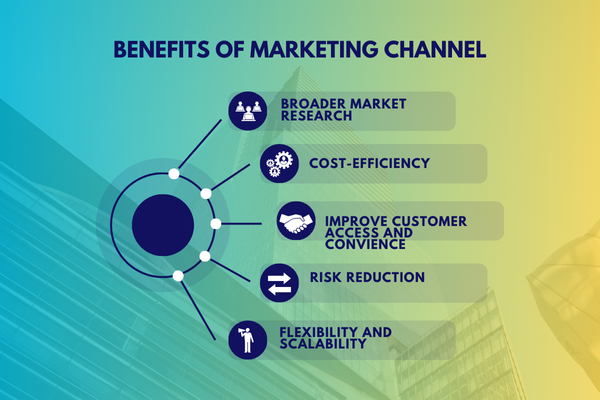Marketing channel is a type of medium used to advertise your company. Learn how to choose the right marketing channel for your business here. All components complete the meaning of “What is a marketing channel?
Digital marketing channels have been around since the earliest days of the internet, but the marketing channel definition has changed with the times.
Back in October of 1994, if someone were to ask “What is a marketing channel?” there would have been only one answer: Display ads.
Marketing Channel is a pathway where our goods, services or information flow from producers to consumers. It involves intermediaries like wholesalers, retailers, and distributors. which helps bridge the gap between the manufacturer and the end user.

These marketing channels for businesses are essential for reaching your target audiences efficiently, increasing brand visibility, and generating sales. Digital marketing channels include social media, Email marketing, Search engine, content marketing. Traditional marketing channels, such as television, radio, and print media are still widely used.
Choosing the right marketing channels depends on factors like target audience, budget, and business goals. Effective channel management ensures that the product or service reaches the customer at the right time, in the right pace, and in the most efficient way, contributing to overall business success.
Types of Marketing Channels
1. Digital advertisement
2.Word-of-mouth
3. Email marketing
4. Event marketing
5. Influence marketing
6. SEO (Search engine optimization)
7. Content marketing
8. Social marketing
9. Website development

Marketing channels for the business are the backbone of any successful Marketing strategy. Each channel has its unique strengths and benefits, and the key to success lies in selecting the right mix of channels that align with your brands goals and target audience. In this article, we’ll cover all marketing channels and their significance.
. Digital advertisement:
Fast forward to 2024, clearly, If you were to pose a question “What is a marketing channel?” in 2024, the answer would be digital advertisement. Digital advertisement is a powerful way to reach global audience, drive traffic, and achieve business goals with measurable and scalable results. Common forms of digital advertising include search engine ads. (e.g. Google ads.), display ads. (banner and image ads. On websites), Social media ads ( on platforms like facebook and Instagram) video ads (on platforms like YouTube) and native ads that blend seamlessly with platform content.
The benefits of digital advertising are vast, including the ability to track and measure performance in real-time, ensuring a higher return on investment (ROI). Additionally, it provides flexibility in budget allocation, enabling businesses to scale their campaigns based on performance. The versatility and cost-effectiveness of digital ads make them essential for businesses of all sizes looking to enhance brand visibility, drive traffic, and increase conversations. As consumer behaviour increasingly shifts online, digital advertising continues to be a critical component of modern marketing strategies.
. Email:
Email marketing is a form of direct marketing, where you reach out to your customer through strategic messages. Email marketing is a powerful tool for businesses to engage directly with your audience by sending targeted messages to subscribers, companies can promote their products, share updates, and nurture customer relationships.
Email marketing is the strategy of sending a commercial message through email to a list of potential customers. 91% of American internet users have an email account, making this one of the best marketing channels for communicating directly with prospects.
Email marketing remains a cost-effective and impactful strategy when executed with the right approach, blending creativity with data-driven insights to foster engagement and loyalty.
Automation is another powerful feature in email marketing. By setting up automated workflows, businesses can send timely and relevant emails without manual intervention.
. Event:
Event marketing Is a dynamic strategy that allows businesses to engage directly with their target audience through planned events. These events can take various forms, including conferences, trade shows, webinars and product launches. The goal is to create meaningful interactions that leave a lasting impression on participants, fostering brand awareness, customer loyalty and lead generation.
One of the biggest advantages of event marketing are the opportunity for face-to-face interaction. In a digital age, Personal connections are highly valuable, and events provide a platform for brands to showcase their personality, values and products in a tangible way.
. Influencer marketing:
Influencer marketing campaigns often involve product Placements, sponsored post, or reviews, where influencers share their experience, and opinion with their followers. Brands collaborate with influencers to reach a specific target audience in an authentic and relatable way, by passing traditional advertising barriers. These influencers, ranging from celebrities to niche content creators, have built trust and credibility within their community, making their endorsements highly effective. The power of this approach lies in its ability to tap into the influencers’ established relationship with their audience, fostering a sense of trust that traditional ads often fail to achieve.
Influencer marketing has become a cornerstone of modern digital strategies, individuals with significant online following to promote products and services. However, influencer marketing is not without its challenges. injuring alignment between the influencers values and the brand’s message is crucial to maintaining authenticity.
Despite these challenges, When excluded will, influencer marketing remains a powerful tool for brands to build credibility, reach new audiences, and drive conversions in today’s digital landscape.
. Search engine optimization:
SEO is a technique to optimize your website with your keywords, content and URL which helps your website to rank higher in the search engine result page for your specific keywords. SEO is the method of making a web page easy to find, easy to crawl, and easy to categorize. It is about serving your customers to find out your business from among thousands other companies. SEO is an indispensable part of any digital marketing strategy.
SEO helps you to make sure higher rank in search engines and more visibility of your brand in the search results.
. Content marketing:
Content is the king of digital marketing and online media. Content marketing is a strategy that focuses on creating a high-quality content, which contributes knowledge, information, solving problems, and guides via social media channels, blogs, websites, podcasts, print publications and more. The goal of content marketing to reach your target audience to build trust, establish brand authority, sales, engagement, loyalty and foster long term relationships with potential customers by addressing their needs and interests.
One of the advantages of content marketing is its ability to improve search engine rankings. Search engines like Google and YouTube prioritize websites that regularly publish high quality relevant content.
Another advantage of content marketing is its cost effectiveness. While creating high quality content requires time and resources, it often delivers a high return on investment compared to traditional advertising methods. This is because content marketing focuses on providing long term value to customers, rather than quick, one time conversions. Over time, a strong content marketing strategy can reduce customer acquisition costs and increase customer lifetime value.
. Social media:
Social media marketing is a form of digital technologies that leverage the power of social networking that is used for marketing purposes through popular digital channels like Facebook, Instagram, YouTube, Linkedin, and Twitter etc. Social media enables individuals to connect with friends and family, follow friends, Discover new content and engage with brands in ways that were unimaginable just a few years ago. It also serves as a dynamic platform for brands to reach their target audiences, build relationships, and drive business outcomes through tailored content and interactive experiences.
One of the strength of social media is its ability to foster real time engagement. Through likes, comments, shares, and direct messages, users can instantly interact with content, giving branch immediate feedback on their marketing efforts. This two way communication allows companies to build deep relationships with their audience, respond to customer enquiries, and address concerns quickly. Social media also provides valuable data and insights into consumer behaviour, present, and trends, enabling businesses to refine their strategies and make data-driven decisions.
. Website:
Create a professional website to show up products, services, and information globally. Website is a group of pages usually containing hyperlinks to each other and make available online by individuals, company or organizations. Creating a website involves several key components that guide you from concept to launch. The first step is selecting a domain name that reflects your website purpose or brand. This is the address where users will find your site. Once you have a domain, choose a web hosting service to store your sites files and make them accessible online.
Next, you’ll need to decide on a platform to build your website. Content management system (CMS) like WordPress, website builders like Wix and Squarespace, offer user-friendly tools to design and manage your site without needing advanced coding skills.
. Word-of-mouth:
Word-of-mouth (WOM) is a powerful and organic form of promotion where customers share their positive experiences with a product, services for brands with others. WOM marketing leverages the genuine recommendations and referrals from satisfied customers, making it one of the most edible and trusted forms of marketing. This trust factor makes WOM marketing incredibly effective in building brand awareness, fostering customer loyalty, and driving sales.
. Traditional marketing:
Traditional marketing encompasses formal methods of promotion used by businesses to reach the target audience before the internet era. It includes various channels such as print media, (Newspapers, magazines) broadcast media (televisions, radio) outdoor advertising (billboards and flyers) and direct mail (catalogues, brochures). These methods have been used since ancient times and are still relevant in many contexts today. However it comes with high cost and limited opportunities for direct customer interaction and different challenges in measuring precise return on investment.
. Direct marketing:
Direct marketing is a strategy where businesses communicate directly with potential customers to encourage immediate action, such as making a purchase or signing up or a service. Unlike traditional advertising, which targets a broad audience, direct marketing focuses on reaching a specific audience in the visuals or groups who are more likely to respond.
Common channels used to direct marketing include email, marketing, direct male, and digital advertising.
. Email Marketing
. Telemarketing
. Direct Mail
. Digital Advertisement
. SMS/Mobile Marketing
Benefits of Marketing Channels
Marketing channels are the pathways through which goods and services flow from the producer to the consumer. These channels, which include intermediaries like wholesalers, retailers, and digital platforms, play a crucial role in a business’s overall marketing strategy. Utilizing a well-structured marketing channel offers several benefits that can enhance a company’s reach, efficiency, and profitability.

- Broader Market Reach:
One of the primary benefits of marketing channels is the ability to extend a company’s reach. By using intermediaries like distributors and retailers, businesses can access a wider audience, including customers in different geographic locations and market segments. For example, a manufacturer can sell products nationwide or globally by partnering with established retail chains or e-commerce platforms, which already have access to large customer bases.
- Specialization and Expertise:
Marketing channels allow businesses to leverage the expertise of intermediaries. Wholesalers and retailers often have specialised knowledge about local markets, customer preferences, and distribution logistics. This expertise helps ensure that products are marketed and sold effectively, with intermediaries often handling tasks like inventory management, merchandising, and customer service. By outsourcing these functions, businesses can focus on their core competencies, such as product development and branding.
- Cost Efficiency:
Utilising marketing channels can lead to cost savings, particularly in distribution and logistics. Instead of investing in an extensive distribution network, a company can use intermediaries who already have the necessary infrastructure. This reduces the costs associated with warehousing, transportation, and sales operations. Additionally, economies of scale can be achieved as intermediaries often buy in bulk, which can lower per-unit costs.
- Improve Customer Access and Convenience:
Marketing channels enhance customer access to products by placing them where customers are most likely to shop. Retail stores, e-commerce websites, and local markets provide convenient purchasing options for consumers. The easier it is for customers to find and buy a product, the more likely they are to complete a purchase. This convenience not only increases sales but also improves customer satisfaction and loyalty.
- Risk Reduction:
Spreading out the responsibilities of marketing and distribution across various intermediaries, businesses can reduce risks. For instance, retailers and wholesalers bear the risk of unsold inventory, and they also handle customer returns and complaints. This reduces the burden on the producer, allowing them to focus on production and innovation rather than on operational challenges.
- Flexibility and Scalability:
Marketing channels offer businesses flexibility in scaling operations. By adjusting the number of intermediaries or choosing different types of channels, companies can quickly respond to changes in demand or market conditions. For example, a company can expand its online presence through e-commerce platforms or enter new markets by partnering with regional distributors.
- Enhance Brand Presence and Customer Relationships:
Effective marketing channels can also enhance a brand’s presence and strengthen customer relationships. Retailers, for instance, play a significant role in showcasing and recommending products, which can influence purchasing decisions. In addition, digital marketing channels, such as social media and email marketing, allow businesses to engage directly with consumers, building stronger relationships and fostering brand loyalty.
Conclusion:
Marketing channels are vital to the success of any business. They not only extend market reach and reduce costs but also enhance customer access and improve efficiency. By choosing the right channels and leveraging the expertise of intermediaries, businesses can optimize their distribution strategies and achieve greater success in the marketplace.
